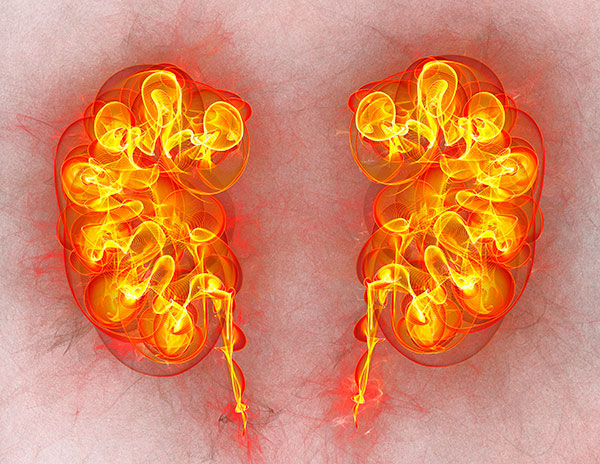About a half million people in the United States alone suffer from autosomal dominant polycystic kidney disease (ADPKD). There is no cure, and researchers are working to develop therapies for the disease. For several decades, researchers have known that mutations in the PKD1 gene, which encodes the polycystin-1 (PC1) protein, can cause the disease in about 80% of cases. However, the protein is too large to be modified through gene therapy strategies. Now, a research team led by Laura Onuchic, MD, postdoctoral researcher in the Yale department of cellular & molecular physiology and Michael Caplan, MD, PhD, chair and C.N.H. Long professor of cellular & molecular physiology and professor of cell biology, has found that just a small piece of this protein might hold the key to preventing the disease.
The findings are published in Nature Communications in an article titled, “The C-terminal tail of polycystin-1 suppresses cystic disease in a mitochondrial enzyme-dependent fashion.”
“Our research shows that a tiny fragment of the PC1 protein—just 200 amino acids from the very tail end of that protein—is enough to suppress the disease in a mouse model,” said Caplan, who was principal investigator of the study. “Our work will provide new insights into the underlying disease mechanisms for polycystic kidney disease and reveal new avenues for developing therapies.”
A little over a year ago, a team led by Stefan Somlo, MD, C.N.H. Long professor of medicine (nephrology) and professor of genetics, found that if they removed the PC1 protein in mouse models, the kidneys became enlarged.
“They did a really beautiful experiment showing that in mouse models of polycystic kidney disease, where these animals get huge cysts in their kidneys, even when those cysts have already developed, turning the expression of the normal protein back on makes the cysts go away,” said Caplan.
“The problem with this as a therapeutic strategy is that this protein is 4300 amino acids long,” added Onuchic. “It’s too big for gene delivery.” The solution, Onuchic and Caplan say, may be to bring gene therapy for ADPKD down to a manageable scale.
Researchers use gene therapy to try to take the sequence that encodes their gene of interest and get it expressed in their desired cells. This usually involves viral vectors. “Viruses can be the Trojan horses that deliver your gene of interest into the cell you need to get it into, but those viruses only have a certain amount of room in their trunk,” said Caplan. Because the PC1 protein is massive, this poses a problem for treating polycystic kidney disease. “PC1 is way too big to fit in the Volkswagen Beetle that is most gene therapy vectors, but now just this 200 amino acid piece can fit in the glove compartment.”
In their new study, the team used a mouse model that they had genetically modified to allow them to turn off the genes associated with polycystic kidney disease. In other words, they genetically induced the disease in these models by creating mutations in the genomes of the mice. As a result, the models developed cysts. Then, the team turned on the expression of the 200 amino acid-long fragment of the protein. “Imagine flipping a light switch where one light goes off and one light goes on,” said Caplan. “We’re turning off the normal polycystic kidney disease gene and turning on the expression of just this tiny piece of the protein.”
The team found that this dramatically reduced the size of the cysts. “Even though we got rid of the full-length PC1 protein, which would normally cause significant cystic disease, just turning on this tiny piece was enough to suppress the disease,” he said.
The team plans to continue pursuing the use of gene therapy, initially in mouse models, for just the 200 amino acid piece, with hopes that their work will one day benefit humans. “From a therapeutic perspective, it’s really exciting that we’ll hopefully be able to at least slow down disease progression,” said Onuchic.


